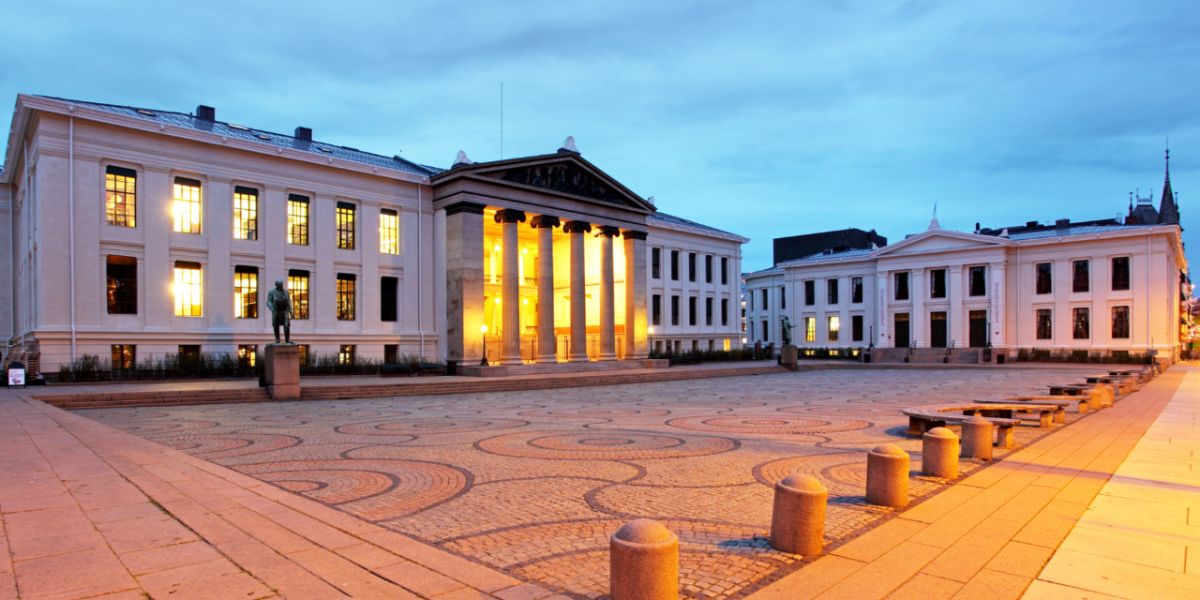
So, you've decided to study in Norway! This nature-rich country is ready to welcome you, and you're ready to explore the opportunities it provides through its education system. From understanding the top schools, universities and programs available to navigating the necessary formalities to this academic adventure, here's everything you need to know before stepping into a Norwegian lecture hall.
Why is Norway popular among international students?
Norway is an increasingly popular destination for international students due to its exceptional education system, progressive higher education policies, and stunning natural landscapes. Here's what makes it stand out:
High-quality education
Norwegian universities are known for their academic excellence, with programs often ranked among the best worldwide. Teaching methods emphasize interaction and critical thinking, preparing students to think independently and creatively.
Affordable education and fees
While public education in Norway was previously free for all students, including internationals, recent changes mean that tuition-free education now applies only to European Union and Swiss citizens since 2023. This has evidently led to a decline in international student numbers, although exceptions can still apply for exchange students and refugees. Tuition costs for some programs range from 130,000 NOK per year (around €11,000) for the most affordable to 500,000 NOK (approximately €42,000) for the most expensive.
Fees vary depending on the institution and the chosen study program. Here's a quick overview of tuition fees at major Norwegian universities:
University of Oslo (UiO)
- Bachelor's programs: 130,000–160,000 NOK per year (€11,000–€14,000).
- Master's programs: 180,000–260,000 NOK per year (€15,000–€22,000).
Norwegian University of Science and Technology (NTNU)
- Bachelor's programs: around 140,000 NOK per year (€12,000).
- Master's programs: 150,000–170,000 NOK per year (€13,000–€15,000).
University of Bergen (UiB)
- Bachelor's programs: around 150,000 NOK per year (€13,000).
- Master's programs: 170,000–200,000 NOK per year (€15,000–€17,000).
University of Stavanger (UiS)
- Bachelor's programs: around 140,000 NOK per year (€12,000).
- Master's programs: 160,000–190,000 NOK per year (€14,000–€16,000).
Inclusive and safe society
Norway consistently ranks among the world's safest and happiest countries. Its inclusive society values equality, making it an ideal, welcoming place for international students from diverse backgrounds.
High living standards
With its modern infrastructure, focus on environmental sustainability, and easy access to nature, Norway offers an exceptional quality of life.
Academic excellence
Norway's education system is internationally acclaimed for its research and innovation-focused approach. Universities excel in fields like natural sciences, engineering, and environmental studies. Prominent institutions include the University of Oslo, the Norwegian University of Science and Technology (NTNU) in Trondheim, and the University of Bergen.
Programs follow the European credit transfer system (ECTS), making Norwegian degrees internationally recognized. Many universities also offer English-taught programs, removing the need for fluency in Norwegian.
Is Norway the right choice for you?
While Norway is a great fit for many, it may not appeal to everyone. If you're drawn to warm weather, bustling nightlife, or budget-friendly living, you might want to consider other options. The country's high living costs, particularly for housing and food, can be a deterrent for some international students.
Top universities in Norway
University of Oslo
The oldest and largest university in Norway, established in 1811, the University of Oslo consistently ranks among the world's finest universities. It excels in social sciences, law, humanities, and medicine. It boasts a diverse student body and a vibrant international community, making it a top choice for international students.
Norwegian University of Science and Technology (NTNU)
Located in Trondheim, the NTNU is the country's largest university in terms of student population and specializes in engineering, technology, and natural sciences, and renewable energy research. It is a leader in renewable energy research, IT, and life sciences.
University of Bergen
Known for excellence in natural sciences, marine sciences, and humanities, the University of Bergen offers not only a top-tier academic environment but also a breathtaking living setting amid Norway's iconic fjords and mountains.
BI Norwegian Business School
The largest business school in Norway, BI Norwegian Business School is internationally renowned and offers sought-after programs in management, finance, and economics.
Norwegian School of Economics (NHH)
Based in Bergen, NHH is Norway's oldest business school and enjoys a strong reputation in the field of economics and management. It offers top-notch undergraduate and master's programs that attract students worldwide.
Popular fields of study in Norway
Renewable energy
Norway is a global leader in hydroelectric, wind, and maritime energy technologies. Hence a hub for sustainable energy studies with the chance opportunity for enrollers to learn in an environment that actively values and invests in these fields.
Marine sciences
Norway's vast coastlines and thriving fishing industry make it a prime location for marine science studies. Norwegian universities of the likes of the University of Bergen offer advanced programs in marine biology, oceanography, and marine resource management.
IT and engineering
Information technology and engineering are trailblazing fields in Norway, with high demand for skilled professionals. Cutting-edge programs at NTNU attract students and researchers alike across the globe.
Social sciences and humanities
Norwegian universities like the University of Oslo excel in social sciences and humanities. Prominent fields include peace and conflict studies, sociology, philosophy, and philosophy – which students can explore in a high-caliber academic environment.
Practicalities for studying in Norway
Requirements
To study in Norway, international students must:
- Be accepted into a recognized program at a Norwegian university.
- Prove that they have sufficient financial resources to support themselves during the duration of their studies (varies around 126,000 NOK or €12,000 annually).
As for required documents and qualifications, these vary depending on the level of study and the specific program. Generally, the applicants must provide the following:
Diplomas and transcripts
- Bachelor's degree (undergraduate): Applicants must provide a certified copy of their high school diploma, equivalent to the Norwegian "Vitnemål fra den Videregående Skole," along with the corresponding transcripts.
- Master's degree (graduate): Applicants are required to submit a certified copy of their bachelor's degree, accompanied by detailed academic transcripts.
Proof of language proficiency
- English programs: Students whose native language is not English are typically required to present results from recognized language tests, such as the TOEFL (minimum score of 60 on iBT) or IELTS (minimum score of 5.0).
- Norwegian programs: For Norwegian-taught programs, proof of language proficiency is required. Accepted certifications include the "Norskprøve" exam at level B2 or higher or other equivalent certifications.
Cover letter – Explaining your reasons for choosing the program and university.
Recommendation letters – References from professors or employers attesting to your skills and abilities.
Detailed CV – Outlining your academic and professional background.
Good to know:
Entrance exams into Norwegian universities' bachelor's or master's programs are typically not required. However, certain specialized programs, especially in artistic or professional fields, may necessitate additional assessments through tests or portfolios.
It is always best to check the official website of the university or specific program for detailed admission requirements.
Language proficiency
- For English-taught programs: TOEFL (min. 60 iBT) or IELTS (min. 5.0).
- For Norwegian-taught programs: Norskprøve exam (B2 level or higher).
Student visa
Nordic and EU citizens
You do not need a visa to study in Norway if you are a citizen of a Nordic or EU/EEA country. However, you must register with the local police if you plan to stay for more than three months.
Non-EU/EEA citizens
Students from countries outside the EU/EEA must apply for a student residence permit, which costs approximately 530 euros. You must also demonstrate that you have sufficient financial resources, around 11,560 euros per year.
Non-EU/EEA students must obtain a student visa to study in Norway. The visa application process may vary depending on your country of origin, but generally involves submitting documents such as the university acceptance letter, proof of financial resources, a valid passport, and health insurance.
The student visa application process involves:
- Completing the online application form on the UDI (Norwegian Directorate of Immigration) website.
- Paying the application fee, which is typically around 5,400 NOK (approximately 500 EUR). Note that additional service fees may apply depending on the visa application center.
- Submitting the required documents and, if necessary, schedule an interview at the nearest Norwegian embassy or consulate.
For more details on the procedures for studying in Norway, visit the official Study in Norway website.
Scholarships
Several scholarships are available for international students wishing to study in Norway. The Norwegian government offers grants through the Norwegian Quota Scheme for students from specific developing countries and those in transition. Additionally, many Norwegian universities provide their own scholarships for international students.
Here are some examples:
- Erasmus Mundus scholarship: For EU students participating in joint programs.
- NORAM scholarship: For American students.
- Scientific and Technological Research Fund scholarship: For students in science and technology fields.
Student facilities
Norwegian universities offer excellent student facilities, including modern libraries, state-of-the-art research laboratories, and well-equipped sports centers. Most of them also offer affordable student housing, although demand can be high, particularly in major cities like Oslo and Bergen.
Student support services
Most universities provide counseling services to help students adjust to life in Norway and manage academic stress.
Students can also join various clubs and associations, ranging from sports groups to cultural and academic clubs, which foster social integration into university life and create opportunities to make new friends.
Student life in Norway
Prepare for the high cost of living
While tuition fees are affordable, the cost of living in Norway is high. It is crucial to budget carefully for accommodation, food, and transportation. Opt for subsidized student housing and take advantage of student discounts, especially for public transportation and cultural activities.
Learn the basics of Norwegian
Although many university programs are offered in English, learning the basics of Norwegian will help you better integrate into Norwegian society, find a student job, and navigate daily life more easily.
Look for a student job
International students are allowed to work up to 20 hours per week in Norway during the academic year and full-time during school holidays. This can help offset the high cost of living. Websites like Finn.no and Work In Norway are useful for finding job opportunities, and universities often post job listings as well.
Enjoy nature and outdoor activities
Norway is the ideal country to experience outdoor life! Embracing the "friluft" (outdoor life) is undoubtedly the best way to immerse yourself in the culture. Whether it's hiking, skiing, or exploring the fjords, Norway offers easy access to breathtaking nature.
DNT, the national hiking association, provides discounted rates for students on cabin stays, guided hikes, and hostel meals. Most often, you will also have the chance to discover the beauty of Norwegian landscapes through student associations. There's nothing better than spending a night by a serene lake to recharge during exam season!
We do our best to provide accurate and up to date information. However, if you have noticed any inaccuracies in this article, please let us know in the comments section below.








